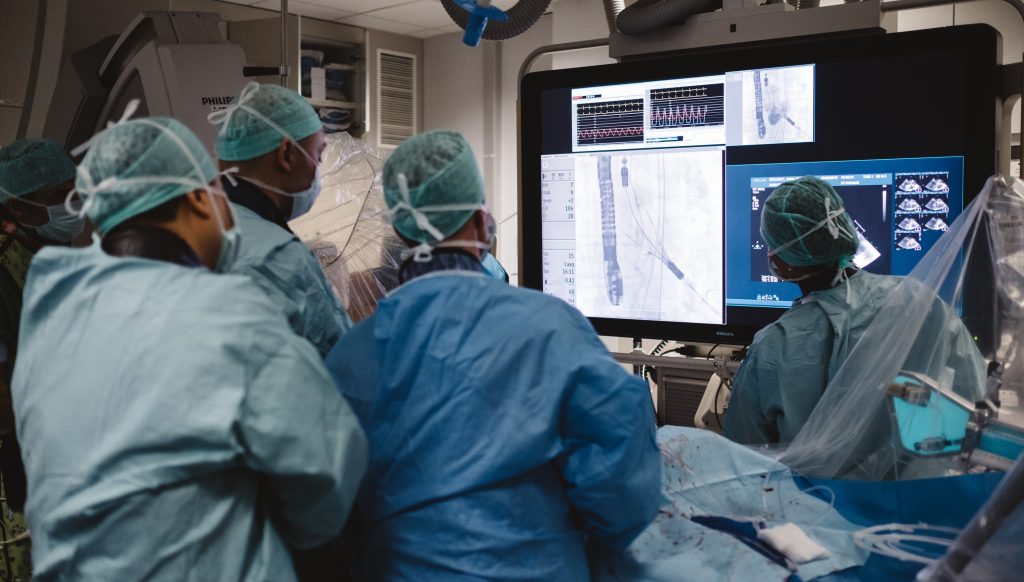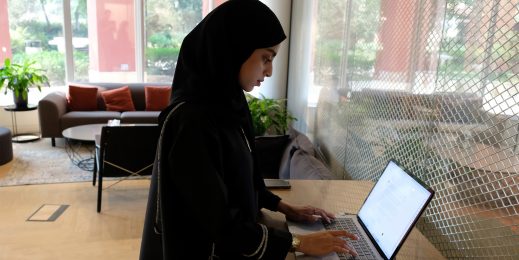
The dawn of a medical revolution
Medicine Man: How AI is bringing humanity back into healthcare
“When mistakes happen, patients die. I remember thinking to myself ‘What is going on here?’ We can do better. We should do better.”
When Simon Kos practiced critical care medicine in intensive care and anaesthesia early on in his career, digital technology was not well established. “I saw mistakes – avoidable mistakes – happen all around me,” he states.
Now Chief Medical Officer at Microsoft, Kos is at the forefront of a medical revolution. His ambition is infectious, and his passion is fuelled by his first-hand experiences of the power that technological transformation, such as artificial intelligence (AI), can bring to our lives.
Follow us at HIMSS Europe, June 10-13, in Helsinki, Finland to learn how health organizations are reimagining healthcare delivery to improve health outcomes using Microsoft solutions like M365 for health.
Transforming healthcare
The term AI is thrown around a lot these days. For many, it conjures up images of a dystopian future where robots have infiltrated society and have replaced our jobs – a perception born out of silver screen fantasies.
“People think about artificial intelligence and immediately jump to the science fiction perceptions of robots,” Kos states. “Instead, when you distill it, it’s about using data in autonomous, mathematical ways, to deliver insights. For example, there are AI machine learning models that show you when you should discharge patients so that they don’t bounce back and have to be re-admitted.”
It’s these insights and technological capabilities, that were the missing link from Kos’ past. While he began his career observing the digitization of data, the real breakthroughs came with the advent of AI, alongside the infinite data storage and analytical processing power of the cloud.
With the introduction of this complementary technology, digitized data became more than just a way to save paper – it became a weapon to help fight disease, illness, and discomfort.
Today, machine learning models are capable of determining when a patient is deteriorating, so that medical intervention can occur before they need to be hospitalised. The outcome is improved patient care and health, and an increase in efficiency and costs saved for both the patient and hospital.
Oschner Health is one example of a company using AI to revolutionise healthcare. Its system is able to accurately track patients who are at risk of cardiac arrest, and can determine when there is a decline in their condition. This allows them to be admitted into intensive care hours earlier than they otherwise would have been. They are provided with potentially life-saving care, before their condition deteriorated to the point where medical care would have been less effective.
Project InnerEye, in use at Addenbrooke’s Hospital in Cambridge, is another solution which uses machine learning and computer vision for the analysis of radiological images. Designed to identify tumours, it improves the delivery of treatments such as radiotherapy, by precisely distinguishing between cancerous and healthy tissues. It can also better monitor disease progression during chemotherapy, so that treatment can be adjusted in line with how patients respond.
These AI solutions allow medical professionals to improve patient care and admittance time, thanks to their improved precision. This, in turn, reduces financial and manpower strain, improving the healthcare experience in the areas where this technology is being used.
This is supported by data from the World Health Organization (WHO), which shows that between 30 and 50 percent of cancer deaths could be avoided with prevention, early detection and treatment. With cancer costing the global economy an excess of an estimated $1.16 trillion a year, the impact of technology such as AI, is game-changing.
 In the UK alone, for example, there are only 4.7 radiologists per 100,000 population, and this number will need to almost double by 2022 to meet demand. Because of this shortage, the NHS spent nearly £88 million in 2016 paying for backlogs of radiology scans to be reported – the same amount could have paid for over 1,000 full-time consultants.
In the UK alone, for example, there are only 4.7 radiologists per 100,000 population, and this number will need to almost double by 2022 to meet demand. Because of this shortage, the NHS spent nearly £88 million in 2016 paying for backlogs of radiology scans to be reported – the same amount could have paid for over 1,000 full-time consultants.
“We are drowning in data in hospitals,” Kos states. “We don’t have enough human brainpower to deal with it all in a timely manner – which in healthcare, is vital.”
Using technology such as AI can therefore substantially decrease strain on healthcare systems, while simultaneously improving patient care and reducing costs, allowing doctors to spend their time on more complex medical diagnoses. Or, indeed, spending more time connecting with patients.
The human factor
Introducing AI to healthcare isn’t removing the humanity from medicine. On the contrary, it’s increasing it.
A study in the Annals of Internal Medicine found that doctors spend nearly twice as much time doing administrative work (49 percent) as they do with their patients (27 percent). In other words, doctors are spending more time crunching through data, sifting through and updating records, and analysing scans, than they are speaking to their patients.
In a profession where people are dealing with often traumatic, life-changing developments, this personal, human touch, is vital for the emotional well-being of patients and their loved ones. By using tools such as AI to free up more of their time, healthcare professionals can focus more on patient interaction, offering reassurance, providing guidance, and answering more questions.
Culture, and the challenges of change
Motivated by the lack of technology during his critical care period, Kos spent eight years crusading to introduce electronic medical record systems into hospitals. But nothing improved.
“We digitized, but we digitized all of the mistakes too. Then it dawned on me – digitization is important, but it’s not transformation.”
Without the supportive technology of cloud storage, or the data analysis powers of AI and machine learning, the full potential of these digitized records weren’t even close to being reached. Only years after, when cloud technology was accepted on a wider scale, and when collaborative tools such as Skype or real-time document editing in the cloud were established – could this initial digitization move on to the next level.
Research has shown that an organisation with the most advanced technology still won’t be as effective if it lacks the right company culture. Employees must be willing to embrace their new tools, while leaders must encourage a culture of learning. Only then, can the new tools be as effective as possible.
In the world of medicine, however, adopting the right culture for technological change can prove to be a challenge.
“Healthcare professionals are rather inward-looking,” says Kos. “Doctors listen to doctors. It’s a very top-down, hierarchical environment. You could have the best technology in the world, but if the culture isn’t ready to embrace it with a willingness to learn, it’s just not going to work.”
We digitized, but we digitized all of the mistakes too. Then it dawned on me – digitization is important, but it’s not transformation.
As the child of two doctors, and having graduated from medical school himself, Kos has seen first-hand the challenges that healthcare professionals can face. Reminiscing on his own experience, Kos describes how six years of conceptual knowledge at medical school, does little to prepare graduates for the real world: “When you turn up to work on the first day, you don’t know how to look after patients. You need to learn on the job from others that do.” As a result, the older generation dictates how things are done, which is in itself, a major cultural challenge.
To distill this concept to its purest level, Kos provides an example of the paper folder – a tool that doctors have been familiar with for hundreds of years – and how doctors are leaving their comfort zones, evolving the way they practice their profession. “In a way we, with the very best of intentions, robbed clinicians of their productivity,” Kos muses. But attitudes are changing.
Clinicians, Kos tells us, respond well to evidence – and the evidence of the benefits of technological transformation have been lacking for a while. For the long time, all it meant was the digitizing of medical records. “Now with artificial intelligence,” he continues “the improvements are so radical that it’s shifting everyone – even the old guard.”
Those unwilling to embrace the necessary changes won’t have their jobs replaced by robots, however. According to Kos “The doctors who are scared that robots will take their job have their fears misplaced. What they should be concerned about is other doctors using AI who will take their jobs.”
On privacy, and the future
Now, more than ever, we are more aware of the data that we share, and few things are more personal than our health, which makes medical data security incredibly important – and valuable to those with malicious intentions.
Healthcare data is, according to Kos, seven times more valuable on the black market than financial data: “If someone steals your financial data, they can steal your funds. If they steal your healthcare data, they can become you, and that’s really scary – especially when you consider that traditionally, healthcare organisations have skimped on security.”
With regulations such as the General Data Protection Regulation (GDPR) now in effect, the spotlight on transparency and data protection has never been brighter. Microsoft’s drive to implement and develop the latest security measures and constantly update its compliance standards is critical in enabling Kos and his team of 1,100 people across the world help healthcare organisations transform in a safe and secure manner.
As for the future, Kos is looking forward to the widespread adoption of precision medicine – healthcare which uses genetic markers to precisely tailor medication and treatments that will respond most favourably to each individual – while avoiding treatments that would cause harm or not work at all.
This is just one of many countless examples of technology that is revolutionising healthcare while increasing the quality of human life. As AI, machine learning and other advancements continue to be developed and adopted, the future of healthcare, and ultimately, humanity, remains an exciting one.















